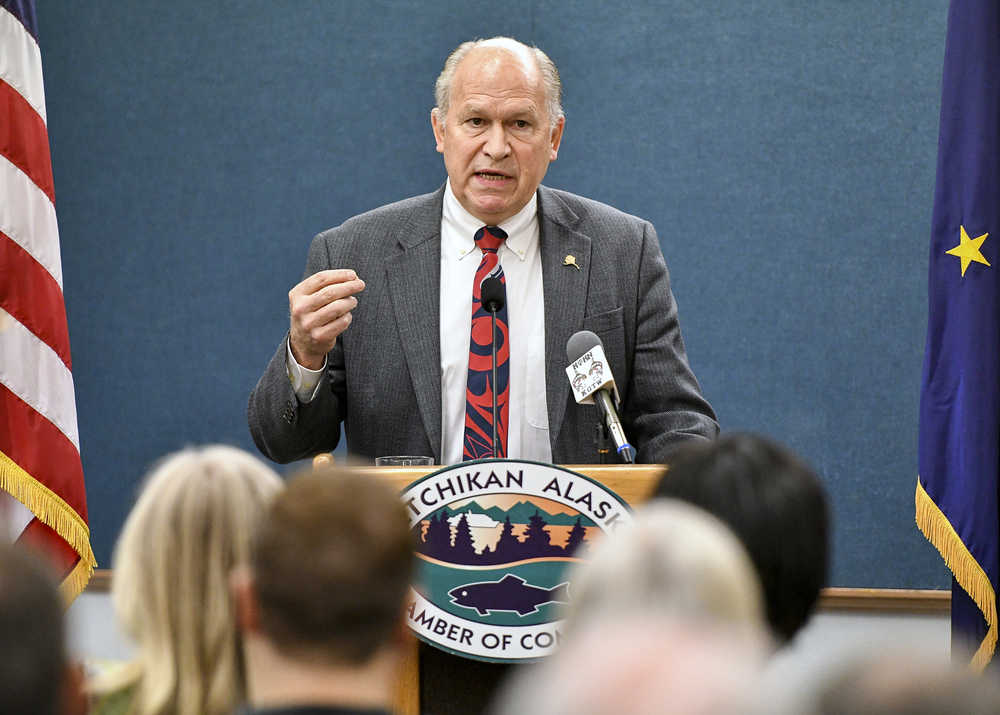KETCHIKAN — Ketchikan residents, getting their first meeting with Gov. Bill Walker since February, asked the governor about issues ranging from the Alaska Marine Highway System to an internet sales tax.
Walker visited the First City on Thursday. He held a noon community forum, met with local leaders and sat down for an interview with Ketchikan media.
At the forum, the independent governor, now two years into his first term, took a half-hour of questions after 20 minutes of remarks mostly about the state’s budget crisis.
Along with the ferry system, residents posed questions an internet sales tax, the state’s pension funds and a few other topics.
Chelsea Goucher, the president of Southeast Conference, which with the state has undertaken a project to reform the ferry system, asked Walker how the nonprofit could convince lawmakers to support their eventual plan.
Reforms will eventually need to be approved by lawmakers and Walker himself.
“My biggest fear is that we’re going to do all of this work and then nothing is going to come of it,” Goucher said.
Walker responded that Southeast Conference should focus on how it presents the argument.
“I see the Alaska Marine Highway System as part of the solution (to the state budget crisis), not part of the problem,” the governor said. “If it’s presented as part of the solution, I think that really is key.”
Walker, a former mayor of Valdez, has been a strong supporter of the ferry system. If Southeast Conference proposes to change the system, he said he’s “willing to push hard for the legislation.”
“I’m sure it will be not just revenue neutral, but revenue positive as far as some of the concepts — at least what I’ve been hearing so far, I’ve been very, very pleased,” Walker said.
Judith McQuerry, who earlier this month was elected to the Ketchikan Gateway Borough Assembly, asked Walker whether he supported an internet sales tax.
In recent years, local brick-and-mortar businesses have maligned the boom of internet retailers, saying they make it much more difficult to do business and don’t contribute to towns like Ketchikan.
Local governments have begun to take notice, and both the Ketchikan City Council and the Assembly have talked about the possibility of a tax on internet purchases.
However, internet sales tax can only be collected on a statewide level, and McQuerry asked Walker about his thoughts on the idea.
“We initially did not prefer a sales tax because a lot of local governments have sales tax and we didn’t want to interfere by stacking a state sales tax on a local sales tax,” Walker said.
He said there are changes needed at the federal level. While he said he supports “buy local” movements and keeping money within a community, he didn’t commit to supporting an internet sales tax.
Bob Sivertsen asked Walker about his plans to sell state bonds to pay down Alaska’s pension debt in the Teacher Retirement System and the Public Employee Retirement System.
Together, the two funds include approximately $7 billion in unfunded debt. Walker’s administration is moving forward with plans to sell between $2.3 billion and $3.3 billion in state bonds to pay down the unfunded debt, according to the Alaska Journal of Commerce.
The state would pay interest rates on both debts, and Walker argued on Thursday that he’s doing the equivalent of refinancing a mortgage.
“Interest rates are very, very low right now. We believe we can cut the interest rate in half on that obligation — take it from 8 percent hopefully down below 4 percent,” Walker said.
Credit rating agencies have warned that the move could further damage the state’s rating, and critics of the plan argue Walker is making a gamble.
“Potentially, the base-case scenario is it would be a $2 billion savings,” Walker said. “Any time you can save $2 billion in the fiscal situation we’re in is a good thing.”
After the forum, Walker revisited a 2014 comment he made to the Ketchikan Daily News about taking action in the Tongass National Forest without federal permission.
As a candidate for office, Walker said the state needed a “lion” in the office who would take risks on the state’s behalf, including developing the Tongass and, farther north, building the road to King Cove without federal permission.
King Cove is still without a road and the Forest Service continues with an amendment to the Tongass Land Management Plan that has made pro-development and pro-timber forces howl because of a lack of timber sales and access to land.
On Thursday, Walker stood by his 2014 position, referring to a conversation he had with former Louisiana Gov. Bobby Jindal, but didn’t offer any solutions for King Cove or the Tongass.
“I certainly am not above doing something that’s maybe a bit aggressive, but we need to make a statement, we need to get someone’s attention about what’s happening up here,” Walker said. “(Jindal’s) comment to me was to do that, to be more aggressive on state’s rights, you need to have two things: One is a crisis, which he had — he had an oil spill in the Gulf Coast — and the media. If the media is there, it gets the story out about why is this governor doing what he’s doing? Why is he not going through the normal process?”
Walker said he believed Alaska had the crisis, because of its huge budget deficits, but not the attention of national media.
The governor didn’t mention plans for action, but only said that “many, many meetings” with Sally Jewel, the secretary of the Department of the Interior, had made little progress on her opposition to the road to King Cove because its path is within a national wildlife refuge.
• This article first appeared in the Ketchikan Daily News and is republished here with permission.

